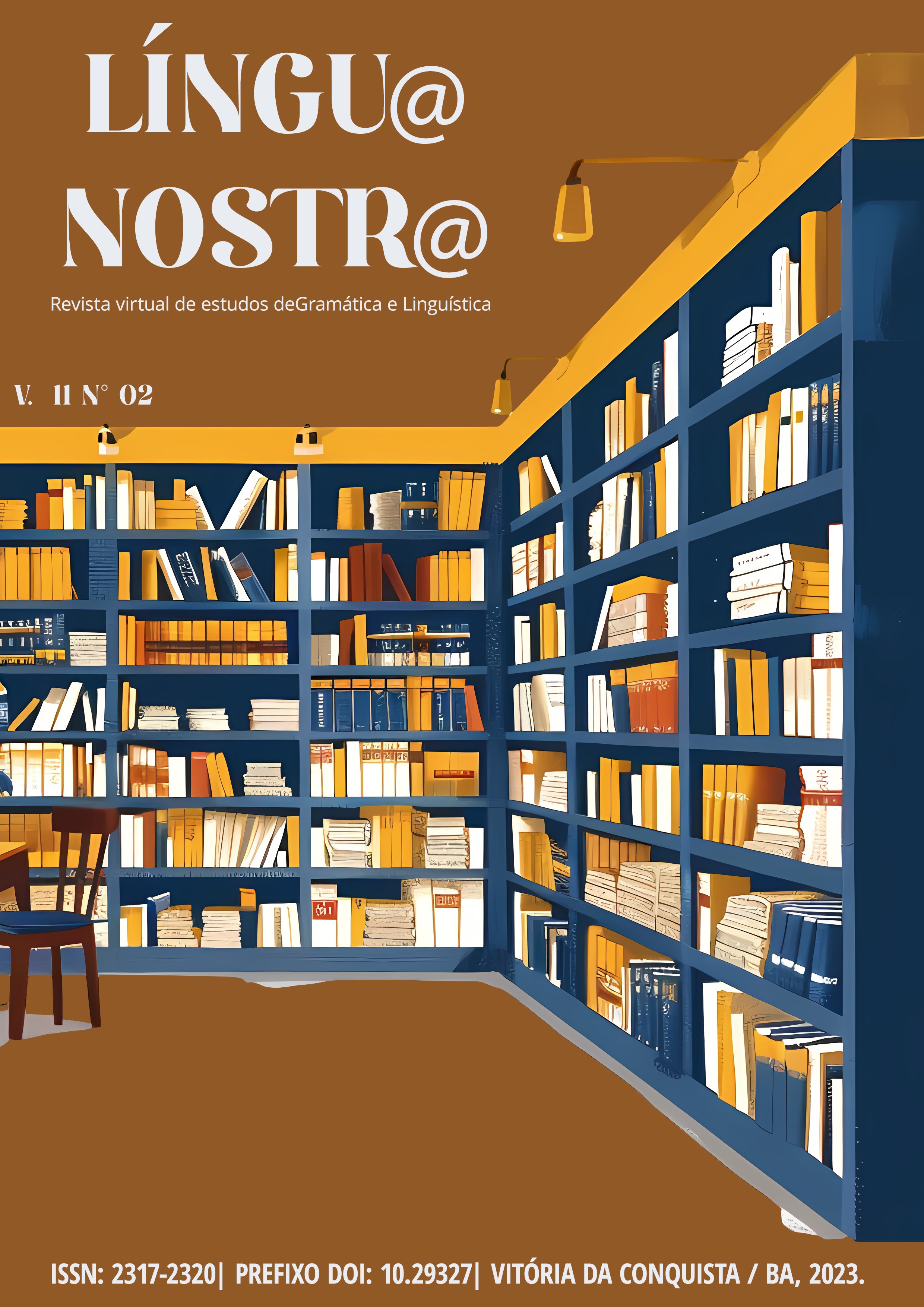O conhecimento do nome ou do som das letras como preditor de aprendizado na etapa inicial da leitura e da escrita
DOI:
https://doi.org/10.22481/lnostra.v11i2.13659Keywords:
Conhecimento do nome ou do som das letras; preditores de aprendizado; leitura e escrita.Abstract
This study is an experimental, longitudinal, descriptive and explanatory psycholinguistic research, qualitative-quantitative in nature. The participants were 80 students from three different public schools in Vitória da Conquista, who responded to the PROLEC instrument upon their arrival in the 1st year of elementary school, and who are in a continuous process of monitoring results with different reading and writing samples (TLE) collected over time. The central objective of this study was to analyze the possible influence of the variable “Letter-name knowledge” on reading and writing performance. The initial hypothesis was that letter-name knowledge would be a strong predictor of initial learning to read and write. The independent variable in our study is, therefore, letter-name knowledge, while the dependent variable is performance in reading and writing. To collect data, participants responded, individually, to the aforementioned tests, in rooms reserved for this purpose, in the schools where they studied. The data obtained in the research were subsequently tabulated in an Excel spreadsheet and exported to the software Jamovi, for descriptive statistical treatment and evaluation of the variable's potential predictor using Simple Linear Regression. The results suggest that the predictor variable under assessment is a strong predictor of later learning in reading and writing (R 0.635). 40% of performance in reading and writing can be explained by knowledge of the name or sound of letters when the student arrives for formal education in the literacy cycle. Furthermore, there is evidence that this variable might lose predictive potential over time.
Downloads
References
BARRERA, S. D.; SANTOS. M. J.; Conhecimento do nome das letras e habilidades iniciais em escrita. Bol. Acad. Paulista de Psicologia, São Paulo, vol. 36, n. 90, p. 1-15, 2016.
BRADLEY, L.; BRYANT, P. Categorizing sounds and learning to read: a causal connection. Nature, London, v. 301, n. 1, 419-421, 1983.
CAPELLINI, S. A.; OLIVEIRA, A. M.; CUETOS, F. PROLEC. Provas de avaliação dos processos de leitura. São Paulo : Casa do Psicólogo; 2010.
CARDOSO-MARTINS, C. Consciência fonológica e alfabetização. Petrópolis: Vozes, 1995
CARDOSO, H. S. P.; FREITAS, P. M.. Aplicação do modelo da dupla rota no diagnóstico da dislexia: Revisão sistemática. Rev. Psicopedagogia, vol.36, n.111, p.368-377, 2019.
CARDOSO-MARTINS, C.; BATISTA, A. C. E. O conhecimento do nome das letras e o desenvolvimento da escrita: evidência de crianças falantes do português. Psicologia: Reflexão e Crítica, v.18, n.3, p.330-336, 2005.
CORRÊA, M. F.; CARDOSO-MARTINS, C.; RODRIGUES, L. A. O conhecimento do nome das letras e a sua relação com o desenvolvimento da escrita: evidência de adultos iletrados. Psicologia: Reflexão e Crítica, vol.23, n.1, p.161-165, 2008.
DANCEY, C. P.; REIDY, J. Estatística sem matemática para psicologia. Porto Alegre: Artmed, 2006.
DAVIS, C. A Report of the OECD-CERI Learning Sciences and Brain Research Shallow vs Non-shallow Orthographies and Learning to Read Workshop. Relatório. 28-29 sep. 2005. St. John's College, Cambridge University, Reino Unido. Co-anfitriado por The Centre for Neuroscience in Education, Cambridge University.
EHRI, L. C., WILCE, L. S., 1979; WINDFUHR, K. L., & SNOWLING, M. J., 2001; apud. FOULIN, J. N., Why is letter-name knowledge such a good predictor of learning to read? Reading and Writing, n. 18, p.129–155, 2005.
GUARESI, R; PALLES, L; ABREU, C. V. C. Técnicas de avaliação do aprendizado da leitura e da escrita na alfabetização inicial [Livro Eletrônico]. Fonema e Grafema. Vitória da Conquista, 2020.
GVION, A; FRIEDMANN, N. A principled relation between reading and naming in acquired and developmental anomia: surface dyslexia following impairment in the phonological output lexicon. Front Psychol., v. 7, p.1.16, 2016.
KELSO, J. A. SCOTT. Dynamic patterns: The self-organization of brain and behavior. The MIT Press, 1995.
LEVIN, I., PATEL, S., MARGALIT, T., & BARAD, N. Letter names: Effect on letter saying, spelling, and word recognition in Hebrew. Applied Psycholinguistics, 23. p. 269-300. 2002.
SEARA, I.; NUNES, V.; LAZZAROTTO-VOLCÃO, C. Fonética e fonologia do português brasileiro: 2º período. Florianópolis, LLV/CCE/UFSC, 2011.
STREET, B. V. Letramentos sociais: abordagens críticas do letramento no desenvolvimento, na etnografia e na educação. São Paulo: Parábola Editorial, 2014.
ZIMMER, M. C.; ALVES, U. K. “Learning to orchestrate time: voicing patterns and gestural drift in L2 speech production.” In São Paulo School of Advanced Studies in Speech. Dynamics — Abstracts. São Paulo, p.47-49, 2010.
Downloads
Published
How to Cite
Issue
Section
License
Copyright (c) 2024 Língu@ Nostr@

This work is licensed under a Creative Commons Attribution 4.0 International License.






